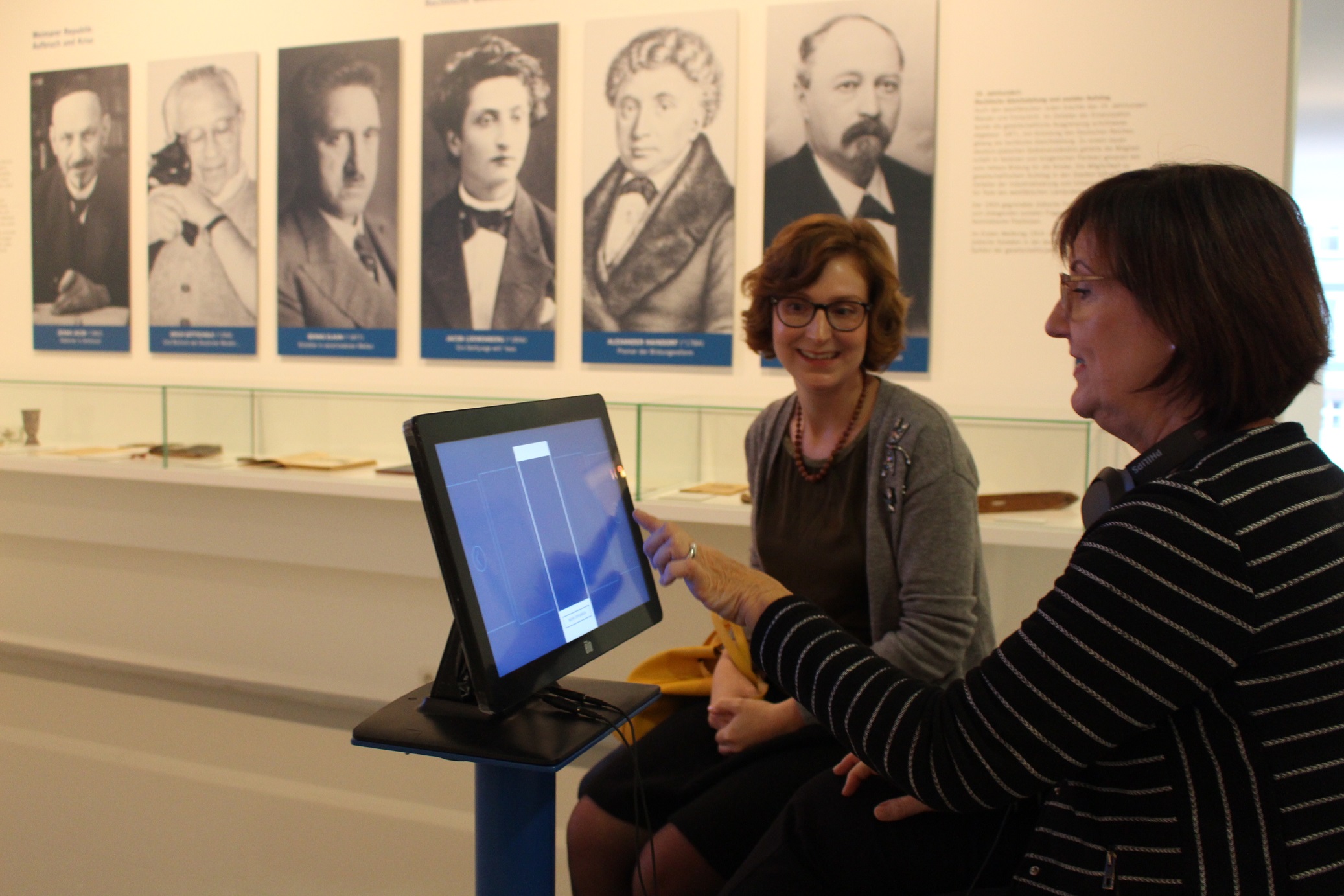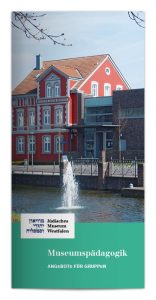
The Jewish Museum of Westphalia offers a wide range of guided tours of the exhibition which provide more insight into our exhibitions. We arrange tours and activities for a wide range of age groups, schools and interests. Below you will find an overview of the activities for children and young people that we have offered up to now.
The Jewish Museum of Westphalia offers a wide range of guided tours of the exhibition which provide more insight into our exhibitions. We arrange tours and activities for a wide range of age groups, schools and interests. Below you will find an overview of the activities for children and young people that we have offered up to now.
Visits can be designed to meet your wishes and can be combined. We welcome any ideas you may have and are happy to plan the visit together with you. On our website you will also find information on programmes for teachers and also teaching material.
Below you will find information on our workshops, project days, films and other activities such as the rallies.
PDF-Document: Museumspädagogische Angebote
We offer the following tours and visits
Dauer
Kosten
Tours and educational programme
approx. 2.5 hours
40.00€ plus 1.50€ admission fee per person*
Guided tour and workshop
approx. 2.5 hours
approx. 2.5 hrs
40.00€ plus 1.50€ admission fee person
Rally with evaluation
approx. 1.5 hours
30.00€ plus 1.50€ admission fee per person
Project day (incl. guided tour)
3.5 – 4.5 hours
5.00€ per person
Guided tours are also possible outside opening times.
*Member towns pay an admission fee of 15€
Groups of 20 people or more are divided up. We form two groups, one starting with a guided tour, then a break followed by the accompanying programme, the other group starting with the accompanying programme. If there are two groups we will charge another 30€ for the second guided tour. There will be no additional charges for the accompanying programme.
Please make a telephone booking and reservation as early as possible. We will make every effort to plan your visit according to the needs of your group.
Contact
Mareike Fiedler
T. 02362 951467
fiedler@jmw-dorsten.de
Workshops
Cooperation with HEIMATSUCHER e.V.
Introduction to Judaism (for 9 to 12year-olds, children’s birthday parties)
Tours designed for children with songs and hands-on displays followed by a workshop: preparing food for Jewish holidays, writing Hebrew with the help of stencils, learning traditional games. Other subjects can also be arranged, e.g. Jewish holidays, Jewish calendar, kosher food. Visits can form part of the following subjects: social studies, politics, history and projects such as e.g., “One World”. “Racism”, “Cultures in Germany”.
For all age groups
Biographies in historical contexts (For all age groups)
HEIMATSUCHER portraits in combination with one of the following subjects:
- Permanent exhibition of the Jewish Museum of Westphalia:
Guided tour: “Anti-Semitism in history and the present day” - “A completely normal day” (see “other activities”)
- “Moral courage – What would you do?” (see “other activities”)
This is what we have already done together. Activities can be changed, adapted or combined; projects lasting several days or longer are also possible.
Where?:
Jewish Museum of Westphalia or at schools (without permanent exhibition)
Charges:
two-hour activities: 5€ per person (min. 60€)
four-hour activities: 7€ per person (min. 80€)
plus travel costs
What are HEIMATSUCHER portraits?
HEIMATSUCHER is a project with people who witnessed the Nazi era. The Association interviews witnesses, documents and tells their stories.
More information on HEIMATSUCHER e.V. can be found at:
https://www.jmw-dorsten.de/kooperation-mit-heimatsucher-e-v/
Project Days
Social Exclusion and Persecution in National Socialism (from year 9)
Apart from tradition and culture of Judaism, the tour of the permanent exhibition also focuses on the persecution of the Jews. This is followed by work in small groups: the fates of individual people (some from this region) illustrate the different forms of Nazi persecution. And we discuss “What have I got to do with it?”
The Holocaust – Strategy and Structures of the Extermination Process (from year 9)
Apart from tradition and culture of Judaism, the tour of the permanent exhibition also focuses on the persecution of the Jews. This is followed by work in small groups which look at racist anti-Semitism, various stages of the extermination process and the issue of responsibility today.
Social Exclusion, Resistance and Moral Courage (from year 9)
What does it have to do with me? Young people often ask this question when National Socialism and persecution of Jews are the subjects of lessons. By looking at social exclusion and resistance during the Nazi period, we hope to sensitise young people and look at social exclusion today. In group work, the students seek possible courses of action for situations in which someone is discriminated against. This study day can also take place at school.
Jewish Communities after 1945 – Go or Stay (from year 10)
After a guided tour of the permanent exhibition, students look at the development of Jewish communities after 1945 and also at biographies of Jewish people from the region. Students can also see a film on Jewish life today.
Jewish Lives in Westphalia (from year 10)
After a guided tour of the permanent exhibition students look at the biographies of Jewish personalities from Westphalia. The focus is on the emancipation and social advancement of Jews from the beginning/middle of the 19th century and the growing exclusion from the early 20th century which culminated in the Shoah.
Anti-Judaism – anti-Semitism – anti-Zionism (from year 11)
The tour of the permanent exhibition does not only focus on tradition and culture of Judaism but also the history of hostility towards Jews. The tour is followed by group work in which selected examples are used to illustrate the centuries of hostility towards Jews. The texts range from the Middle Ages to anti-Semitism in the German Empire to present-day anti-Zionism.
Jewish Lives – writing from a perspective
After a short introductory tour, students actively explore the exhibition “Jewish Lives in Westphalia” (texts, audio stations). Small groups prepare their own texts, such as letters, diaries, reports and dialogues from the point of view of the people in the portraits and then present their results to the whole group.
Project Day on “Job” by Joseph Roth
The tour of the exhibition on Jewish religion and culture focuses on exhibits and Jewish holidays also mentioned in the book.
Students then work in small groups on different subjects: orthodoxy, shtetl, emigration, living conditions in the USA, maintaining and losing traditions.
Subject oriented film studies
Willi wants to know. What do you believe if you’re Jewish (year 3 to 6)
In the children’s TV programme “Willi will’s wissen” (Willi wants to know) the reporter Willi Weitzel provides information on a variety of subjects. In the programme on Judaism, Willi visits a synagogue, gets to know a Rabbi and the Thora. Then he learns something about the persecution of Jews by the Nazis. Willi also learns about Jewish dietary laws and holidays and goes to a Bar Mitzvah.
Willie’s VIPs. The Diary of Anne Frank (year 4 to year 6)
In the children’s programme “Willi’s VIPs” Willi Weitzel meets famous people. In the programme on Anne Frank, he meets one of Anne’s old school friends, visits the Frank family’s hiding place and Anne’s old school.
The Diary of Anne Frank – “A Book full of Dreams” (year 7 to 9)
The short film has two timelines. It not only looks at the story of Anne Frank but there is also a link to the present day through Martin, a boy who is reading the Diary. Martin tries, for example, to make connections between the persecution of Jews and injustice today.
No pork please. Kosher and halal lives in the Rhineland (from year 9)
Food is a central element of culture. People experience and show identities, emotions and homeland in and through their daily meals. Religion also influences what we eat. Almost all religions have more or less detailed dietary laws. What influence do these religious dietary rules have on people’s everyday lives today?
The film accompanies a Jewish and a Moslem family in their kitchens.
Helmut Noach – “Die Last der Erinnerung” (The Burden of Memory) (from year 9)
In the autobiographical film holocaust survivor Helmuth Noach talks about his life. He is the only member of his family to have survived the Holocaust. He speaks about fear, desperation and grief in the years of persecution. And the film shows him talking at schools.
A Journey of the Heart, Marga Spiegel and her Saviours (from year 9)
Marga Spiegel, her husband and daughter survived the Holocaust because they were hidden by farmers.
The film, made by Petra Seeger. focuses on Marga Spiegel, who died in 2014 aged 101, and her saviour Anni Aschoff. They talk about two years of great danger, of many difficulties and of a happy ending for all involved.
Other Activities
Museum Rally (year 3 to 6, children’s birthday parties)
After a short guided tour, children have the opportunity to learn about Judaism in an easy and playful way. Hands-on activities, listening, puzzles help them to discover the museum. They fill in answers to questions on activity sheets which take them round the museum. The audio guide helps them to find the answers to lots of the questions.
Moral Courage – What would you do? (from year 7)
When does discrimination start? What forms of discrimination are there? What can I do if I experience discrimination? How do I show moral courage? Using dilemma situation, students discuss these and similar subjects.
“A completely normal day” (from year 8)
The project “A completely normal day” deals with anti-Jewish laws and orders under the National Socialist regime. It clearly shows the social exclusion that Jews suffered and the restrictions in their everyday lives. The students first write down their daily routines and the extent of social exclusion then becomes quite clear.
“A completely normal day” was developed by the Anne Frank Zentrum Berlin.
“All human beings are equal” (from year 9)
The aim of the project is to show the different situations of people living in Germany and to point out the various forms of inequality in everyday life. Everyone is given role cards and takes on a role/person. Questions are then asked and everyone answers playing the role of the person on their cards. The students in the room move because anyone who answers “yes” moves one step forward.
“All people are equal” was developed by the Anne Frank Zentrum, Berlin.







